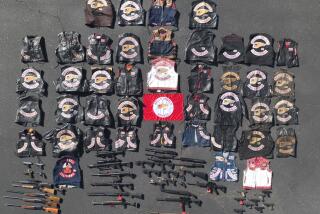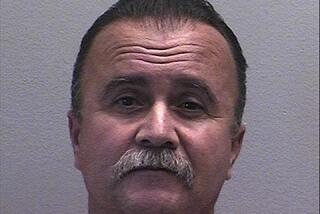Deadly Texas biker gang shootout rooted in brazen rivalries, authorities say
It started, the police were told, with an argument over a parking space outside a sports pub in a shopping mall.
Another dispute broke out in the bathroom, and it didn’t take long before a battle was underway — knives, clubs, brass knuckles and bullets flying past the familiar facades of Best Buy and Office Depot.
Related: 7 motorcycle clubs the feds say are highly structured criminal enterprises
By the time it was over, the parking lot at the Twin Peaks restaurant was strewn with shell casings, puddles of blood, bullet-riddled cars and abandoned motorcycles. Nine people were dead, 18 injured and more than 170 arrested on suspicion of engaging in organized crime.
Authorities are still trying to piece together the genesis of the brawl — reportedly a territorial dispute between biker gangs.
Related: Up to four officers fired during biker gang shootout in Waco, Texas
So stunning was the sudden violence in this city Waco Police Sgt. W. Patrick Swanton described as “Anytown, USA” that the restaurant’s corporate management summarily revoked its franchise Monday.
On Tuesday morning, the McLennan County Jail was still processing those who were arrested. About 50 were expected to be arraigned Tuesday and an associate judge and justice of the peace have come to the jail to assist in the unusual situation, staff said.
The bail for dozens of defendants has been set at up to $1 million each.
At the shootout scene, a mix of police, heavily armed SWAT team members, FBI and ATF agents kept guard under a tent in the rain. Police have not yet identified the dead and injured and have not said how many officers fired during the melee or whether police shot anyone.
“Texas will not stand for the type of lawlessness we witnessed in Waco,” Gov. Greg Abbott said.
The shootout stands as one of the most brazen fights involving motorcycle clubs in recent memory, part of what law enforcement authorities say is an increasingly contentious motorcycle gang subculture whose feuds are becoming dangerously public.
The backcountry bars and Harley hide-outs that formed the backdrop of biker brawls of the 1960s and ’70s, authorities say, have given way to bloody confrontations at corner restaurants, shopping centers and casinos.
“I think there’s something different happening here. It seems bolder, more in-our-face,” said Randy McBee, an associate professor at Texas Tech University who studies biker culture. “Look at a map and this place is right in the middle of a Dollar General and four or five churches. This is right out in the open.”
The most visible example of biker gang violence was in 2002, when the annual motorcycle rally in Laughlin, Nev., erupted in a massive gunfight between Hells Angels and Mongols that left three people dead. The shootout at the Colorado River gambling resort about 90 miles south of Las Vegas started when a member of the Mongols walked into a crowd of Hells Angels near a casino entrance.
Four years later, police in Austin, Texas, announced that members of the Bandidos Motorcycle Club, founded in Houston, were the prime suspects in the slaying of a local motorcyclist, Anthony Benesh, who had been trying to start an Austin chapter of the Hells Angels. Benesh was shot as he was leaving a restaurant with his girlfriend and two children.
Sunday’s confrontation in Waco also appears to have started as a result of a dispute involving the Bandidos, one of the world’s largest motorcycle clubs, with as many as 2,500 members in 14 countries, and one that’s engaged in distribution of heroin, cocaine and methamphetamine, according to the Justice Department. One of their mottoes: “We’re the people your parents warned you about.”
“They were once the terrors of Texas, so fearsome that when a rumor spread through a town that they were coming, people literally headed inside their homes and locked their doors,” Skip Hollandsworth wrote of the Bandidos in Texas Monthly in 2007.
In this case, the Cossacks biker gang appears to have decided to engage with the far larger Bandidos, according to accounts from some of those familiar with the gathering.
The occasion was a publicly scheduled meeting of the Texas Confederation of Clubs and Independents, a grass-roots gathering called to discuss legislative and safety issues, according to William A. Smith, a Dallas-based attorney and biker. “They happen about every other month,” he said, and always unfolded without violence.
The purported dispute involving the Bandidos and the Cossacks had its roots in 2013, said former Bandido leader Edward Winterhalder, who now writes books on motorcycle gangs and consults on television shows. The Cossacks club, which was founded in Texas in 1969, offended the Bandidos when it affixed the word “Texas” to the bottom of its colors, a territory-claiming patch also known as the “bottom rocker,” he said.
The Bandidos swiftly warned the Cossacks to remove the label, Winterhalder said, but the Cossacks refused.
Fistfights escalated to worse violence, including an incident in December 2013 when a Bandido leader was accused of stabbing two Cossacks in Abilene, Texas.
On Sunday, Winterhalder said, the Cossacks and their support club, the Scimitars, arrived at the Twin Peaks restaurant prepared for violence.
Steve Cook, a Kansas City, Mo.-area police officer with the Midwest Outlaw Motorcycle Investigators Assn. who has worked undercover with a gang affiliated with the Bandidos, said police were aware of the tension but could only stand by until the violence broke out.
“We’ve known for several months that there was some trouble brewing with the Cossacks and the Bandidos, sources we had within the Cossacks that have said this is going to erupt if we put this rocker on,” Cook said. “There’s nothing Waco police could have done that they didn’t do.”
A Waco business owner who asked not to be identified for fear of retaliation defended the Cossacks. “They were just some hardworking guys getting together to defend basic principles of America: not to be bullied,” he said. “They’re fighting about a piece of cloth, but it’s civil liberties.... Did they copyright Texas?”
The violence that seems endemic to motorcycle gangs is rooted in a subculture that thrives, as it always has, on the margins — in low-level drug rings, extortion rackets and murder-for-hire plots.
Five clubs make up the main biker gangs in the U.S., and they constitute a small part of overall gang activity; a 2013 FBI report puts their number at just 2.5% of gang members in the U.S.
But they contribute an outsize share of violence, according to the same report, responsible for about 11% of violent gang behavior. In recent years, disputes over turf have been supplemented with wars over drug money along the Southwest border, particularly as relationships have sprouted between biker gangs and Mexican drug cartels.
“They’re the vendors and the subcontractors of that world,” said Lance Sumpter, director of the federal government’s Texoma High Intensity Drug Trafficking Area task force.
Many motorcycle clubs are seeing their ranks increasingly filled by former service members, McBee said.
“There’s a certain appeal to people who enjoy the adrenaline of war,” he said. “There’s also a tendency for clubs to recruit veterans for their skills and sometimes their access to weapons.”
For those involved in Sunday’s violence or who knew people who were, there is much anger and not many answers.
Steve Cochran, Waco-based director of the Texas legislative committee for the national motorcycle group U.S. Defenders, was supposed to attend Sunday’s meeting.
“I pulled up when the shooting was going on and the police had the parking lot blocked off,” he said. “I had a lot of friends in there.”
Cochran said he took cover behind a crane in the parking lot, but could hear at least a dozen rounds fired, likely by police.
“I got out of the way,” Cochran said.
He was not sure Monday whether his friends were among those injured and killed.
“The people that were right there and would know,” he said, “are all in jail.”
molly.hennessy-fiske@latimes.com
nigel.duara@latimes.com
matt.pearce@latimes.com
Also:
Hells Angels Motorcycle Club members arrested after holiday toy drive
More to Read
Start your day right
Sign up for Essential California for news, features and recommendations from the L.A. Times and beyond in your inbox six days a week.
You may occasionally receive promotional content from the Los Angeles Times.









